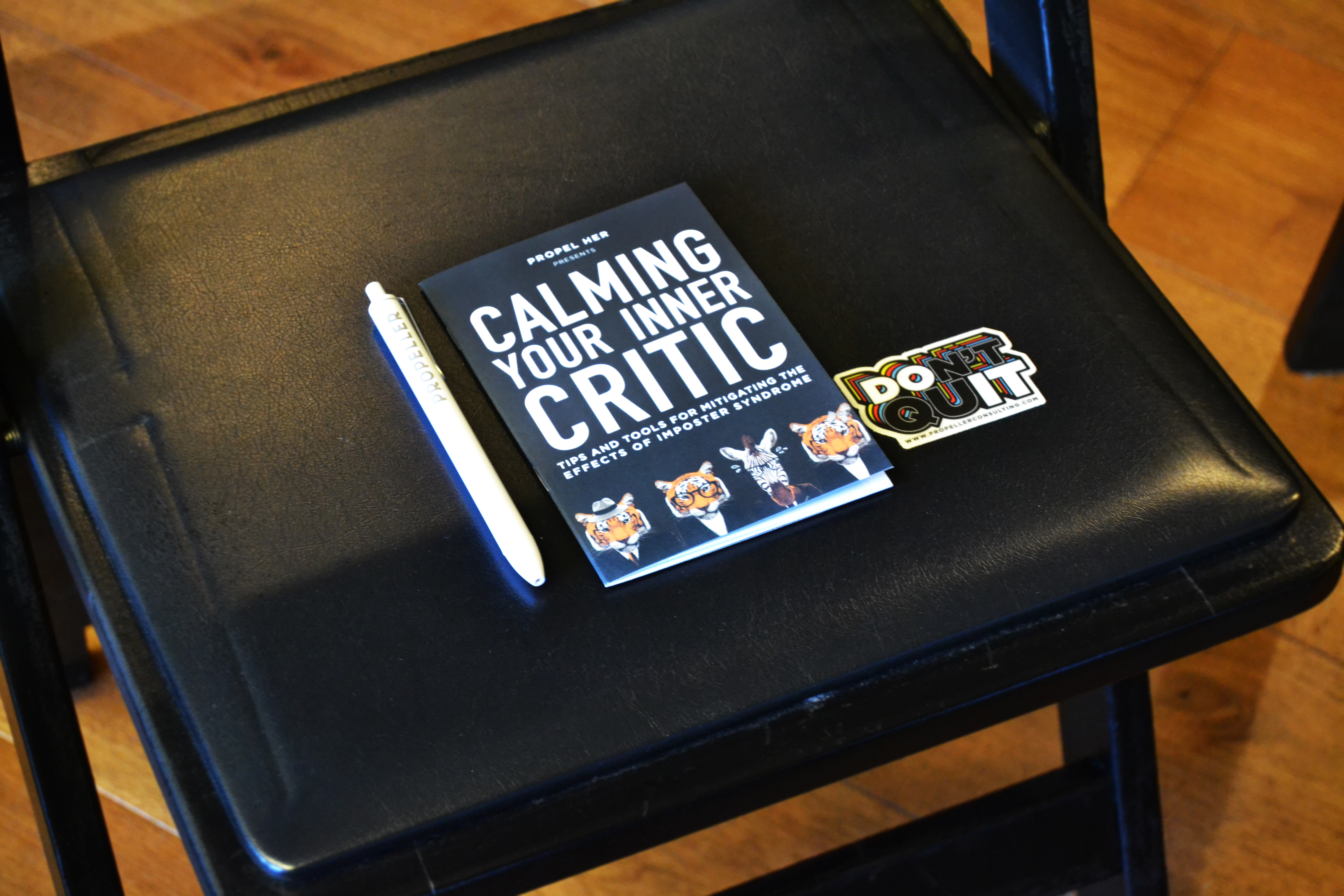Do you ever look at your success in work and think “this is plain luck – I don’t deserve this”? Or maybe you worry “they’re going to find out I’m a fraud – I don’t really know what I’m doing!” It’s called Imposter Syndrome, and you’re not alone. While the syndrome was first identified from clinical observations of high achieving women who believed they were intellectual frauds, and feared being recognized as impostors, research suggests that 70% of adults experience it at some point in their lives. It makes it difficult for women to recognize — let alone celebrate — their successes and achievements. This feeling of inadequacy persists despite evident success, and even celebrities aren’t immune:
When I won the Oscar, I thought it was a fluke. I thought everybody would find out, and they’d take it back. They’d come to my house, knocking on the door, ‘Excuse me, we meant to give that to someone else.'
– Jodie Foster
Propeller recently hosted a full-house Propel Her* event focused on “Calming Your Inner Critic,” exposing why and how imposter syndrome rears its ugly head to hinder us from accomplishing goals. Even though this topic has been discussed since the 1970’s, and has been explained in different ways, we wanted to take a different approach. The night was led by Erica Babino of Speak in Green Consulting and Aubrie De Clerck of Coaching for Clarity.

The purpose of the event was twofold. First, we wanted to help attendees gain a better understanding of the syndrome, not only for themselves, but to help others who are affected, and to provide tips and tools for mitigating it. Let’s face it, the syndrome may never go away despite our efforts to overcome it. Second, we wanted to address how intimidating it can be for those perceived as very accomplished individuals. In actuality, even accomplished individuals have their own stories of struggle and vulnerability that make them more human and resilient, which speaks to a pillar of Propeller’s ethos: Embrace Grit. These highlights from the event helped us all walk away with more clarity and confidence.

# 1. RECOGNIZE THE SIGNS & NIP IT IN THE BUD
Imposter syndrome has nothing to do with low self-esteem or confidence, but rather an inability to emotionally accept accomplishments and success. It is prevalent among the high performers in the workplace. If you are often feeling inadequate and unsure of your abilities, have a hard time accepting praise, are engaging in negative self-talk or dwelling on past mistakes, be mindful that those feelings can lead you down a dark path.
When you practice chronic self-doubt, it can unfortunately become your reality. You may end up feeling stuck in a job with limited career growth because you have a hard time advocating for yourself or your promotion. This can hold you back and limit your career opportunities. The key is to watch for the signs and manage them before this negativity depletes your physical and emotional well-being.
# 2. ACKNOWLEDGE THE EXTERNAL FACTORS THAT PLAY A ROLE
How a person affected by imposter syndrome struggles to manage it can have a lot to do with past experience, family circumstances, their organization’s culture and other factors. Throughout life, someone may have received undeserved praise or no praise at all. That makes it harder for the person to accept her/his own successes.
Are you the first of your family to go to college or to achieve a professional career? You may be more likely to experience imposter syndrome. As unfair as it is, people who experience discrimination or who need to overcome more obstacles than others to be successful are also more likely to experience it.
# 3. TAKE ACTION TO TAME THE NEGATIVE CHATTER
Give it a name! It may sound simple, or even corny, but naming your self-doubt makes it easier to recognize. One event attendee takes this literally and refers to her imposter syndrome as Steve. When she starts to feel the familiar second-guessing and doubts, she says: (sometimes out loud), “Steve, go away. You’re not serving me.”
Make connections. Imposter syndrome almost always happens in isolation. It’s an internal feeling that creeps in and a story you tell yourself. Break that isolation by creating friendships at work, establishing a mentor relationship, and collecting your group of trusted cheerleaders – the people who see the best in you and your abilities. Take it a step further and be that cheerleader for others. Be generous with your praise of others by giving compliments and truly appreciating their strengths.
Strike a pose. When you start to feel like an imposter, physically change your body position – stand up, talk, put your hands on your hips and choose your own power pose. Change your mental positioning too. Give yourself grace and compassion. Remind yourself of all your great accomplishments and the work you put in to achieve them – you may even want to start a journal to write them down.
By having intentional conversations about imposter syndrome, we can diminish the taboo around this topic so it can be openly discussed in the workplace. While we may not be able to overcome it, we can feel more empowered by understanding its signs, effects, and ways we can adjust our behaviors to not only mitigate this syndrome, but provide support to others.
*About Propel Her
Propeller formed Propel Her in 2017 as a community to foster female leadership and provide training in response to the unique challenges women face in the business world. Get in touch if you would like to learn more or be added to our invitation list for future events.

Brooke Graham has more than 10 years of experience leading strategic, operational and organizational initiatives. Her background includes senior roles at Energy Trust of Oregon, where she developed change management strategies, and standards and procedures to enhance the customer and contractor experience. She holds a bachelor’s degree in liberal studies from the University of Montana.

Linda Villarreal is a masterful curator of meaningful connections. Her experience includes business operations and financial asset analyst roles at Cisco and Dell EMC, where she defined and executed innovative budget management, forecasting, and talent recruitment and onboarding strategies. Linda holds a bachelor’s degree in business administration, accounting, and finance from North Carolina State University.





